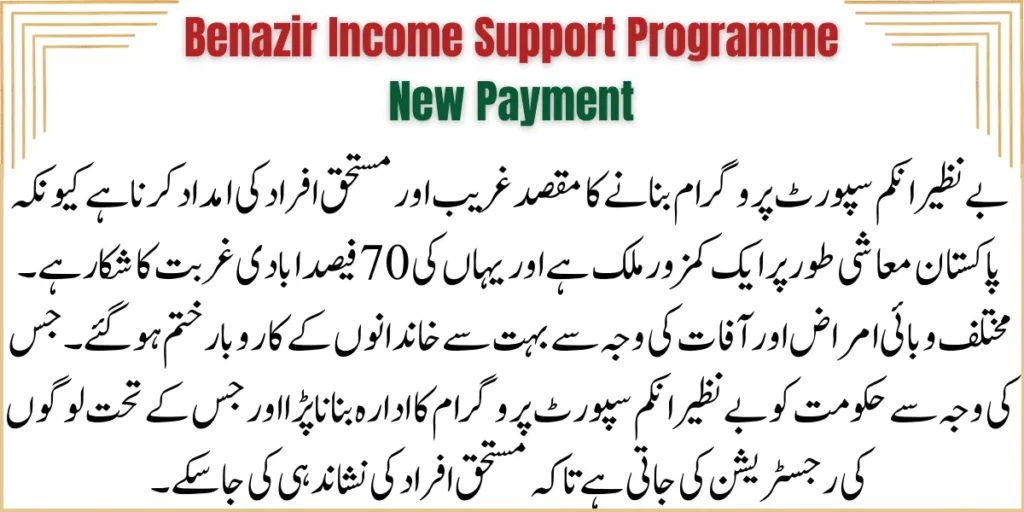The Benazir Income Support Programme (BISP) New Payment initiative, introduced by the Government of Pakistan, stands as a testament to the nation’s commitment to uplifting its impoverished citizens. This article delves into the various facets of the program, from its inception to the latest developments in the payment system.
1. Introduction
The BISP New Payment program is a beacon of hope for those struggling to meet their monthly expenses in Pakistan. Established by the government, its primary aim is to extend financial assistance to the country’s less privileged, providing a safety net for those unable to cover their basic needs with their current income.
2. Purpose of BISP New Payment Program
At its core, the BISP New Payment Program strives to alleviate poverty by offering direct financial aid to individuals with limited means. This initiative recognizes the challenges faced by a significant portion of the population and seeks to bridge the financial gap for those on the brink of economic hardship.
3. Impact of BISP on Pakistan’s Population
Remarkably, BISP has had a profound impact on the lives of the Pakistani people, with approximately 70% of the population benefiting from its assistance. The program’s success lies in its ability to address the pressing needs of the most vulnerable members of society.
4. Expansion of BISP to Include Previously Unregistered Individuals
A notable development in the BISP landscape is the inclusion of individuals not previously registered in the program. This expansion aims to reach even more deserving individuals, ensuring that those in need receive timely financial support.
5. Increased Amount in BISP Payments
Recognizing the growing financial challenges faced by the vulnerable, the BISP program has raised the assistance amount. This augmentation reflects the government’s commitment to providing substantial aid to those who qualify for assistance.

6. Eligibility Criteria for BISP Registration
To qualify for BISP, individuals must meet specific criteria, including having an income below 50,000 and not holding a government job. This stringent eligibility ensures that assistance is directed to those most in need.
7. BISP Online Registration 2023
While BISP aims to streamline its processes, online registration is not currently available. Prospective beneficiaries are required to visit BISP centers for in-person registration.
8. Registration Process at BISP Centers
The registration process at BISP centers involves providing necessary information to the center staff. This personal touch ensures accurate and efficient registration, catering to the unique needs of each individual seeking assistance.
9. Re-registration of Previously Disqualified Individuals
A positive development is the re-registration of individuals who were disqualified in the past. This inclusivity ensures that deserving candidates are not excluded, granting them access to the support they need.
10. BISP Kafalat Registration and CNIC Verification
For those interested in the program, BISP Kafalat Registration, coupled with CNIC verification, is essential. This process adds an extra layer of validation, confirming the authenticity of applicants.
11. Checking BISP Registration Status
Checking BISP registration status is a straightforward process. Beneficiaries receive a confirmation message from BISP once registered. Additionally, checking through the helpline (8171) provides instant verification.
12. Role of NSER in BISP Program
The National Socio-Economic Registry (NSER) plays a crucial role in the BISP program. Established in 2011, NSER collects household data, contributing to the identification and registration of eligible individuals.
13. NSER Registration Process
NSER’s door-to-door registration involves collecting data on household members, expenses, and monthly income. This meticulous process ensures an accurate representation of the socio-economic landscape.
14. Data Collection and Household Information
Over the past decade, NSER has gathered data from 27 million households, providing valuable insights into the nation’s socio-economic conditions. This comprehensive data collection aids in the targeted distribution of financial assistance.
15. NSER Dynamic Registry for Improved Accuracy
The introduction of the NSER Dynamic Registry marks a significant advancement in data accuracy. This innovative approach addresses errors and adapts to changing socio-economic dynamics, enhancing the efficacy of the BISP program.
Conclusion
In conclusion, the Benazir Income Support Programme New Payment 2023-24 exemplifies the government’s commitment to eradicating poverty and providing a safety net for its citizens. The program’s continuous evolution, coupled with the rigorous data collection efforts of NSER, ensures that assistance reaches those who need it most.
FAQs – Unveiling the Details
- Q: How can I check my BISP registration status?
- A: You will receive a confirmation message from BISP upon successful registration. Alternatively, call 8171 to inquire about your status.
- Q: Is online registration available for BISP?
- A: Currently, online registration is not available. Visit the nearest BISP center for in-person registration.
- Q: What is the eligibility criteria for BISP?
- A: Individuals with an income below 50,000 and without a government job are eligible for BISP.
- Q: Can previously disqualified individuals re-register?
- A: Yes, the program allows for the re-registration of individuals who were disqualified in the past.
- Q: What is the purpose of NSER in the BISP program?
- A: NSER collects household data to identify and register eligible individuals for the BISP program.
BISP Basic Information Required
| Information | Details |
| Contact Number | 0800-26477, 051-9246326 |
| Address | Benazir Income Support Program, Block F, Pak Secretariat, Islamabad, Pakistan |
| Registration Document Required | CNIC, B-Forms, Mobile No, Gas/Electricity Bill, Home Rent Agreement if Available. |

